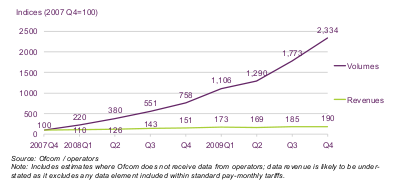This article is more than 1 year old
UK mobile networks more popular than ever
Even if they are making less money...
The UK's mobile sector has never carried more traffic, but revenue was down last year for the first time ever as users demanded and got more service for less money.
Ofcom's Communications Market Report (lengthy pdf) says many things about the industry, not least that it's the first time the UK's mobile operators have seen turnover go into reverse. The mobile industry was still worth £14.9bn in 2009, but that's three and a half per cent less than the year before as voice and messaging revenue has fallen massively, and while people are spending more on mobile data it's not making up the difference.
Not that people aren't talking - mobile voice traffic is up more than six per cent, and messaging up by a quarter, but users are paying less for those services. Revenue from data has risen by 70 per cent since 2007, but that's unsurprising since the quantity of traffic jumped by 240 per cent between 2008 and 2009.

Including fixed-line data, Ofcom reckons that every year since 2005 the number of bits has risen every year by 70 per cent, while the revenue extracted from those using the bits has only gone up by one per cent annually. It's true that the cost of delivering those bits doesn't go up in a linear fashion, but the disparity is worrying for both fixed and wireless companies.
Users do still prefer using fixed lines when they can, with the consensus being that fixed connections are both cheaper and faster. The latter may be true, but in its report Ofcom points out that mobile broadband is now priced very competitively with fixed connections, and suggests that it's data capping that worries people. Few users hit the caps imposed by mobile operators, but the fear of doing so and incurring additional charges pushes users towards a fixed alternative.
12 per cent of UK adults are using mobile broadband, though most of them in addition to a fixed connection at home. Those in rented accommodation tend to opt for a wireless link, which makes sense.
But competing with ADSL isn't going to make money for the network operators, and it seems neither is providing mobile internet for a fixed fee. If network operators are going to fund 4G deployments, and pay suitably outrageous amounts at the UK's forthcoming mega-auction of radio spectrum then they're going to have to find a better way of squeezing more money from us. ®
